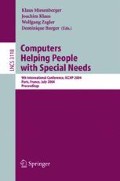Abstract
One of the effective instruction methods for students with learning ability is to check precedent knowledge of students before learning and to supplement it when want of precedent knowledge is found. In this paper, we propose an adaptive tutoring system, which analyzes learning characteristics of students with leaning disability, diagnoses learning problems of them, and then provides proper advice accordingly. The system uses concept map to represent relationships among learning concepts and to diagnose the learning problems of students.
Access this chapter
Tax calculation will be finalised at checkout
Purchases are for personal use only
Preview
Unable to display preview. Download preview PDF.
References
Bender, W.N.: Learning disabilities: Characteristics, identification and teaching strategies. Allyn and Bacon, Needham Heighrs (1992)
Gwo-Jen, H.: A Concept map model for developing intelligent tutoring systems. Computers & Education 40, 217–235 (2000)
Novak, J.D., et al.: The use of concept mapping and knowledge mapping with junior high school science students. Science Education 67, 625–645 (1983)
Jonassen, D.H.: Computers in the classroom: Mindtools for critical thinking. Merill/Prentice Hall, Eaglewoods (1996)
Brusilovsky, P.: Adaptive Educational System on the World Web: A Review of Available Technologies, http://www.aml.cs.umass.edu/stern/websits/itsworkshop/brusilovsky.html
Siegel, L.S.: Issues in the definition and diagnosis of learning disabilities 32, 304–319 (1999)
Yoshikawa, A., et al.: Intelligent tutoring system for electric circuit exercising. IEEE Transaction on Education 35(2), 222–225 (2000)
Ausubel, D.: Educational psychology: A cognitive view. Holt, Rinehart, and Winston, New York (1968)
Papanikolaou, K.A., et al.: INSPIRE: an Intelligent system for personalized instruction in a remote environment. In: The proc. of 3rd workshop on Adaptive Hypertext and Hypermedia (2001)
Author information
Authors and Affiliations
Editor information
Editors and Affiliations
Rights and permissions
Copyright information
© 2004 Springer-Verlag Berlin Heidelberg
About this paper
Cite this paper
Choi, SY. (2004). A Concept Map_Based Adaptive Tutoring System Supporting Learning Diagnosis for Students with Learning Disability. In: Miesenberger, K., Klaus, J., Zagler, W.L., Burger, D. (eds) Computers Helping People with Special Needs. ICCHP 2004. Lecture Notes in Computer Science, vol 3118. Springer, Berlin, Heidelberg. https://doi.org/10.1007/978-3-540-27817-7_29
Download citation
DOI: https://doi.org/10.1007/978-3-540-27817-7_29
Publisher Name: Springer, Berlin, Heidelberg
Print ISBN: 978-3-540-22334-4
Online ISBN: 978-3-540-27817-7
eBook Packages: Springer Book Archive

